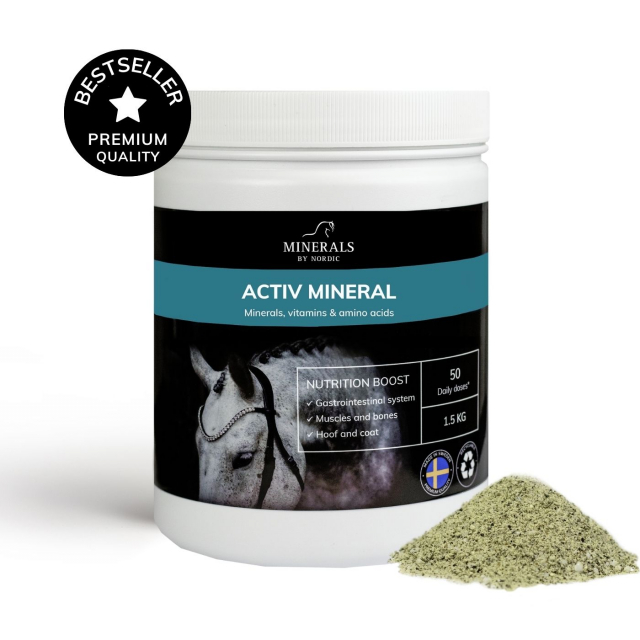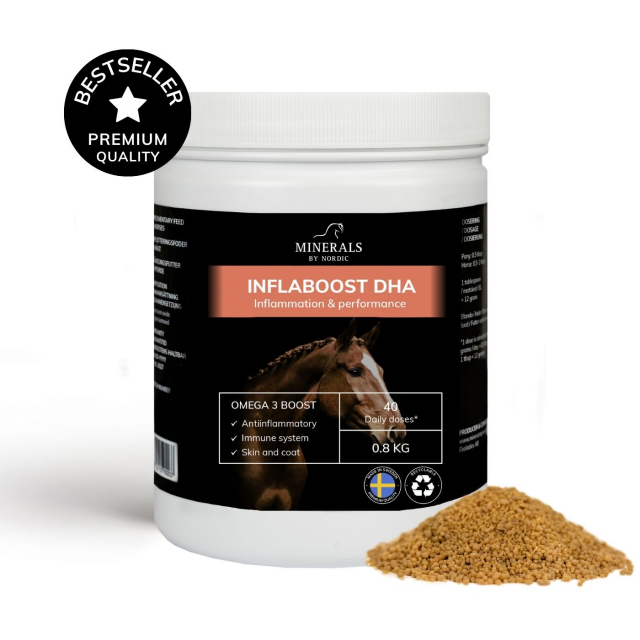Horses with stomach and intestinal issues need the best support they can get through diet and supplements. Diarrhea, watery stools, gastric ulcers, laminitis, and colic are some gut-related problems that can be supported with the products below. Activ Mineral is needed to support the stomach with all minerals and amino acids for a well-functioning system. Inflaboost DHA is good for stomach problems caused by inflammatory conditions. Höveler's Pur.Mash and Pur.Gastro contain prebiotic substances to support the stomach and intestines.
Horse feed with support for stomach & intestines | Colic | Gastric ulcer
Filtrera nedan:
Sort by:
Visar
1-3
av
3
artiklar
Horse Feed Products for Better Stomach and Intestinal FunctionPur.Gastro & Pur.Mash
Prebiotics help to balance the intestinal flora and promote a healthy gut environment. Prebiotics build up the horse's own good bacteria. Psyllium husk is known to help clear the intestines of sand, thereby preventing sand colic. Pectin is also included in these products and has been shown to have a protective effect on the stomach lining and can be helpful for horses with gastric ulcers.
Inflaboost DHA
Omega-3 fatty acids can help reduce inflammation in the body, including the gastrointestinal tract.
L-glutamine
An amino acid that can support the repair and health of intestinal tissue. It can be particularly useful for horses with or at risk for gastric ulcers. This is found in Activ Mineral.
Magnesium and Calcium
These minerals can help neutralize stomach acid and reduce the risk of gastric ulcers. However, they should be used in the correct balance, as they also affect other body functions. These are found in Activ Mineral and Mg Control.
Why do horses get colic?
There are various reasons it can happen, but some of the most common are:
Feed-related causes: Changes in feed, feeding routines, or consumption of, for example, too much grain, poor quality hay, or low-quality feed can lead to digestive problems that later lead to more serious problems.
Gas formation: Accumulation of gas in the intestines can cause bloating and discomfort for the horse. This can occur due to rapid feed consumption, poor-quality feed, or disturbances in intestinal movements.
Parasites: Some parasites, such as worms, can cause damage to the intestinal wall and lead to colic symptoms in horses.
Stress and exercise: Stressful situations, changes in the environment, or intense physical activity can increase the risk of colic in horses by affecting their digestive system.
Medical conditions: Certain medical conditions such as gastric ulcers, inflammatory bowel diseases, or other health problems can also contribute to a horse developing colic.
What are the symptoms of a horse with colic?
To detect if your horse has colic or is beginning to have problems, it is good to know what indications to look out for. Some of the most common symptoms are:
Increased restlessness and agitation.
Increased heart rate (tachycardia).
Decreased appetite or even a total absence of appetite.
Abnormal sweating and an increased pulse.
Reduction or even complete absence of stool.
Behavior where the horse rolls abnormally a lot, hitting the ground.
The horse stretches or tries to lie down without being able to succeed.
Cold sweating that occurs without the horse having made any direct movement or activity
Visibly tense abdomen or bloating.
Making grimaces or showing signs of pain.
It is important to note that symptoms can vary depending on the cause of the colic and its severity. Any suspicion of colic in a horse should be taken seriously, and immediate veterinary care should be sought.
What does it mean when a horse gets colic?
When a horse gets colic, it means that it is experiencing painful abdominal problems. Colic can be the result of various factors, including digestive issues, intestinal obstruction, or gas accumulation in the stomach or intestines. It is a serious condition that requires immediate veterinary care as it can lead to serious complications if not treated quickly and correctly. The veterinarian can then take several measures to treat the horse, depending on the severity of the condition and its cause.
Initially, a thorough examination of the horse is conducted to assess its general condition and identify any physical abnormalities or symptoms of colic. To relieve the horse's pain, the veterinarian may administer pain relievers or other medications that are suitable to reduce discomfort. If the horse is also dehydrated or has imbalances in fluid levels, fluids are given intravenously to restore fluid balance and prevent dehydration. To relieve gas accumulations in the stomach, the veterinarian may use a nasogastric tube to remove excess gas and fluid from the horse's stomach. However, in some cases, especially if there is an intestinal obstruction or other serious complications, surgical intervention may be necessary to correct the problem and save the horse's life.
The veterinarian may prescribe medications to treat any underlying causes of colic, such as antibiotics to treat infections or other drugs to relieve inflammation, thereby preventing the problem from recurring again and again.
Prebiotics help to balance the intestinal flora and promote a healthy gut environment. Prebiotics build up the horse's own good bacteria. Psyllium husk is known to help clear the intestines of sand, thereby preventing sand colic. Pectin is also included in these products and has been shown to have a protective effect on the stomach lining and can be helpful for horses with gastric ulcers.
Inflaboost DHA
Omega-3 fatty acids can help reduce inflammation in the body, including the gastrointestinal tract.
L-glutamine
An amino acid that can support the repair and health of intestinal tissue. It can be particularly useful for horses with or at risk for gastric ulcers. This is found in Activ Mineral.
Magnesium and Calcium
These minerals can help neutralize stomach acid and reduce the risk of gastric ulcers. However, they should be used in the correct balance, as they also affect other body functions. These are found in Activ Mineral and Mg Control.
Why do horses get colic?
There are various reasons it can happen, but some of the most common are:
Feed-related causes: Changes in feed, feeding routines, or consumption of, for example, too much grain, poor quality hay, or low-quality feed can lead to digestive problems that later lead to more serious problems.
Gas formation: Accumulation of gas in the intestines can cause bloating and discomfort for the horse. This can occur due to rapid feed consumption, poor-quality feed, or disturbances in intestinal movements.
Parasites: Some parasites, such as worms, can cause damage to the intestinal wall and lead to colic symptoms in horses.
Stress and exercise: Stressful situations, changes in the environment, or intense physical activity can increase the risk of colic in horses by affecting their digestive system.
Medical conditions: Certain medical conditions such as gastric ulcers, inflammatory bowel diseases, or other health problems can also contribute to a horse developing colic.
What are the symptoms of a horse with colic?
To detect if your horse has colic or is beginning to have problems, it is good to know what indications to look out for. Some of the most common symptoms are:
Increased restlessness and agitation.
Increased heart rate (tachycardia).
Decreased appetite or even a total absence of appetite.
Abnormal sweating and an increased pulse.
Reduction or even complete absence of stool.
Behavior where the horse rolls abnormally a lot, hitting the ground.
The horse stretches or tries to lie down without being able to succeed.
Cold sweating that occurs without the horse having made any direct movement or activity
Visibly tense abdomen or bloating.
Making grimaces or showing signs of pain.
It is important to note that symptoms can vary depending on the cause of the colic and its severity. Any suspicion of colic in a horse should be taken seriously, and immediate veterinary care should be sought.
What does it mean when a horse gets colic?
When a horse gets colic, it means that it is experiencing painful abdominal problems. Colic can be the result of various factors, including digestive issues, intestinal obstruction, or gas accumulation in the stomach or intestines. It is a serious condition that requires immediate veterinary care as it can lead to serious complications if not treated quickly and correctly. The veterinarian can then take several measures to treat the horse, depending on the severity of the condition and its cause.
Initially, a thorough examination of the horse is conducted to assess its general condition and identify any physical abnormalities or symptoms of colic. To relieve the horse's pain, the veterinarian may administer pain relievers or other medications that are suitable to reduce discomfort. If the horse is also dehydrated or has imbalances in fluid levels, fluids are given intravenously to restore fluid balance and prevent dehydration. To relieve gas accumulations in the stomach, the veterinarian may use a nasogastric tube to remove excess gas and fluid from the horse's stomach. However, in some cases, especially if there is an intestinal obstruction or other serious complications, surgical intervention may be necessary to correct the problem and save the horse's life.
The veterinarian may prescribe medications to treat any underlying causes of colic, such as antibiotics to treat infections or other drugs to relieve inflammation, thereby preventing the problem from recurring again and again.

 SWE
SWE


 ENG
ENG NO
NO AX
AX DE
DE